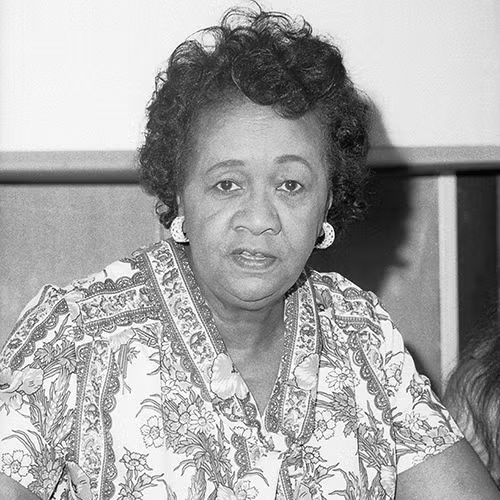
Table of Contents
Who Was Dorothy Height?
Dorothy Height was a pioneering civil rights and women’s rights leader, best known for her role as president of the National Council of Negro Women (NCNW). Throughout her life, she worked tirelessly to address the inequalities faced by African Americans and women. In the 1990s, she expanded her advocacy to focus on issues affecting younger generations, such as drug abuse, illiteracy, and unemployment. In recognition of her lifelong dedication, Height was awarded the Presidential Medal of Freedom in 1994 and the Congressional Gold Medal in 2004.
Early Life and Education
Born on March 24, 1912, in Richmond, Virginia, Dorothy Height moved with her family to Rankin, Pennsylvania, where she attended racially integrated schools. A gifted orator, Height was actively involved in social and political causes from a young age, including anti-lynching campaigns. Her public speaking talents led her to win a national oratory competition, earning her a college scholarship.
Despite initially being accepted to Barnard College, she was denied entry due to the school’s quota for Black students. Undeterred, Height pursued her education at New York University, where she earned both a bachelor’s degree in education (1930) and a master’s degree in psychology (1932).
Tireless Activism
Dorothy Height began her career as a social worker before joining the Harlem YWCA in 1937. It was there that she met Mary McLeod Bethune, the founder of the NCNW, and quickly became involved with the organization. In 1946, she directed the integration of all YWCA centers and later established its Center for Racial Justice, which she led until 1977.
Height rose to national prominence as the president of the NCNW in 1957. She worked closely with civil rights icons such as Martin Luther King Jr. and A. Philip Randolph. Despite her significant contributions, including helping organize the 1963 March on Washington, she was not invited to speak, a moment that made her realize the persistent gender inequality within the civil rights movement.
Committed to advancing women’s rights, Height co-founded the National Women’s Political Caucus in 1971 alongside Gloria Steinem, Betty Friedan, and Shirley Chisholm.
Legacy and Later Years
Dorothy Height continued to lead the NCNW for decades, championing causes like strengthening African American families. In 1986, she launched the annual Black Family Reunion to celebrate African American culture and values. Even after retiring from the YWCA, Height’s leadership and advocacy remained influential, making her one of the most respected figures in American history.
Her life’s work left an indelible mark on both the civil rights and women’s rights movements, and her legacy continues to inspire new generations.
Later Years and Legacy
Dorothy Height received numerous accolades for her lifelong dedication to social justice and civil rights. In 1994, President Bill Clinton honored her with the Presidential Medal of Freedom, recognizing her remarkable contributions to society. Although she stepped down as president of the National Council of Negro Women (NCNW) in the late 1990s, she continued to serve as the chair of the board until her death in 2010. In 2002, she turned her 90th birthday celebration into a fundraiser for the NCNW, with notable contributions from celebrities such as Oprah Winfrey and Don King.
In 2004, President George W. Bush awarded Height the Congressional Gold Medal, further solidifying her status as a civil rights icon. She developed a close relationship with President Barack Obama, the first African American president of the United States, who referred to her as “the godmother of the civil rights movement,” according to The New York Times. Dorothy Height passed away in Washington, D.C., on April 20, 2010, leaving behind an extraordinary legacy.
Among those who mourned her passing was former First Lady and Secretary of State Hillary Clinton, who told The Washington Post that Height “understood that women’s rights and civil rights are indivisible. She stood up for the rights of women every chance she had.” To commemorate her legacy, the United States Postal Service issued the Dorothy Height Forever stamp on February 1, 2017, as part of the Black History Month celebrations.
